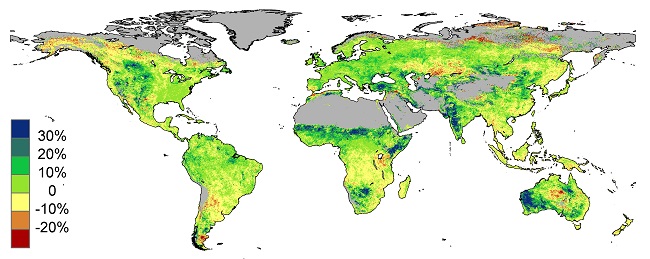Cancel 2016.2
The Almighty
LMAO... completely debunked by your previous link.
you just keep pretending science is on your side when its not.
You have to cherry pick
we dont
Desh is nothing but a pure partisan dyke.
science is NOT on your side no matter how much you twist and spin
I notice that nobody has addressed why there hasn't been any statistically significant warming for the last 16 years, which is at least as long as the previous warning period from 1980. I also get very tired of the old chestnut about Exxon being behind all the deniers whilst ignoring Goldman Sachs who are still trying to get the carbon trading bubble inflated. I have posted at least a dozen peer reviewed papers on here but it always seems to be the same old refrain, where is the credible evidence? There is credible evidence to say that rising CO2 is a good thing as it is causing erstwhile deserts to bloom again and introduces a powerful negative feedback mechanism as well.
Far from turning the Earth into a baking lifeless hell as had been thought, elevated levels of atmospheric CO[SUB]2[/SUB] are causing the deserts of the world to bloom with new green foliage.

Fire up the patio heater and watch the world turn green!
That's according to new research from government scientists in Australia, who've been scanning the planet's formerly dry and lifeless regions using satellite imagery. "We found a strong link between the rise in atmospheric CO[SUB]2[/SUB] concentrations and a greening that’s been observed across many of the world’s arid environments," explains Dr Randall Donohue of the Commonwealth Scientific and Industrial Research Organisation (CSIRO), Australia's national science agency.
According to Donohue and his colleagues' research, climbing levels of CO[SUB]2[/SUB] in the air correlated with an 11 per cent increase in foliage cover from 1982 to 2010 across arid areas in Australia, North America, the Middle East and Africa. "In Australia, our native vegetation is superbly adapted to surviving in arid environments and it consequently uses water very efficiently," Dr Donohue says. "This, along with the vast extents of arid landscapes, means Australia featured prominently in our results."
Scientists had long speculated that rising carbon levels would make life easier for the green plants which keep us all alive by the sun-powered process of photosynthesis, in which they suck CO[SUB]2[/SUB] from the air, mix it with water to make sugar for themselves and throw away some of the oxygen (so permitting us animals to breathe). "Our work was able to tease-out the CO[SUB]2[/SUB] fertilisation effect," explains Donohue, saying he and his team adjusted their satellite data to account for other processes such as precipitation, air temperature, the amount of light, and land-use changes.
Donohue cautions that the greening of the deserts could have unforeseen side-effects - for instance there might be more wildfires, now that there are more leaves and plants in arid regions to dry out and burn during hot seasons. Certainly there has been much media coverage of wildfires in recent years. Nonetheless, he says, "on the face of it, elevated CO[SUB]2[/SUB] boosting the foliage in dry country is good news". That would certainly seem to be true for those worried about a warming world. A powerful negative feedback of this sort would suggest that worries over positive-feedback runaway warming - of the sort which underlies the more negative climate forecasts - is much less likely than had been thought.
Donohue and his colleagues' research has been published in the journal Geophysical Research Letters, and was flagged up by CSIRO here. ®
http://www.theregister.co.uk/2013/07/11/co2_greens_the_deserts/
science is NOT on your side no matter how much you twist and spin
If you are so fucking smart, Why is Desh your main target?LMAO... please show me the evidence that supports the above Desh. You can barely spell science, so I really don't think I will go by what you think.
and NOT increasing them thingy
reduce the use of fossil fuels
has our attempts to reduce it and its effects crashed the economy yet?
